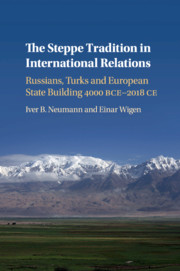Crossref Citations
This Book has been
cited by the following publications. This list is generated based on data provided by Crossref.
Neumann, Iver B.
2020.
Durkheim og staten.
Norsk sosiologisk tidsskrift,
Vol. 4,
Issue. 4,
p.
241.
Levin, Jamie
and
MacKay, Joseph
2020.
Nomad-State Relationships in International Relations.
p.
1.
Costa Buranelli, Filippo
2020.
Nomad-State Relationships in International Relations.
p.
77.
Spruyt, Hendrik
2020.
The Longue Durée and the impact of the Eurasian Steppe.
Cambridge Review of International Affairs,
Vol. 33,
Issue. 6,
p.
950.
Blachford, Kevin
2021.
From Thucydides to 1648: The “Missing” Years in IR and the Missing Voices in World History.
International Studies Perspectives,
Vol. 22,
Issue. 4,
p.
495.
Kalra, Prajakti
and
Saxena, Siddharth Shanker
2021.
Globalizing local understanding of fragility in Eurasia.
Journal of Eurasian Studies,
Vol. 12,
Issue. 2,
p.
103.
Oskanian, Kevork
2021.
Russian Exceptionalism between East and West.
p.
51.
Duzgun, Eren
2022.
Debating ‘uneven and combined development’: beyond Ottoman patrimonialism.
Journal of International Relations and Development,
Vol. 25,
Issue. 2,
p.
297.
Kalra, Prajakti
2022.
Locating Central Eurasia’s inherent resilience.
Cambridge Review of International Affairs,
Vol. 35,
Issue. 2,
p.
235.
Korosteleva, Elena A.
and
Petrova, Irina
2022.
What makes communities resilient in times of complexity and change?.
Cambridge Review of International Affairs,
Vol. 35,
Issue. 2,
p.
137.
Stetter, Stephan
2022.
Handbuch Internationale Beziehungen.
p.
1.
Tsygankov, Andrei
2022.
Russia, Eurasia and the Meaning of Crimea.
Europe-Asia Studies,
Vol. 74,
Issue. 9,
p.
1551.
Kustermans, Jorg
and
Horemans, Rikkert
2022.
Four Conceptions of Authority in International Relations.
International Organization,
Vol. 76,
Issue. 1,
p.
204.
Li, Andy Hanlun
2022.
From alien land to inalienable parts of China: how Qing imperial possessions became the Chinese Frontiers.
European Journal of International Relations,
Vol. 28,
Issue. 2,
p.
237.
Fisher-Onar, Nora
and
Kavalski, Emilian
2022.
From Trans-Atlantic Order to Afro-Eur-Asian Worlds? Reimagining International Relations as Interlocking Regional Worlds.
Global Studies Quarterly,
Vol. 2,
Issue. 4,
Fisher-Onar, Nora
2022.
The Capitulations Syndrome: Why Revisionist Powers Leverage Post-Colonial Sensibilities toward Post-Imperial Projects.
Global Studies Quarterly,
Vol. 2,
Issue. 4,
Buranelli, Filippo Costa
2023.
Of nomads and khanates: heteronomy and interpolity order in 19th-century Central Asia.
European Journal of International Relations,
Neumann, Iver B.
2023.
The study of international society after Watson.
International Politics,
Mukoyama, Naosuke
2023.
The Eastern cousins of European sovereign states? The development of linear borders in early modern Japan.
European Journal of International Relations,
Vol. 29,
Issue. 2,
p.
255.
Hui, Victoria Tin-bor
2023.
‘The rise and Fall of Eurasian world orders’,
the Francesco Guicciardini prize forum
.
Cambridge Review of International Affairs,
Vol. 36,
Issue. 6,
p.
774.





